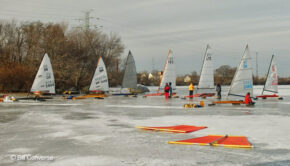Let’s do something really little
Published on May 8th, 2023
by Craig Leweck, Scuttlebutt Sailing News
Our society likes to keep score, and sailing feels the pinch of this shift. For an activity that need not include competition, we shine the light brightest on the winners. Measuring fun is hard, but regatta results are black and white.
This pressure is felt greatest on children who need to build confidence. There are many ways to enjoy time on the water, yet parents reach for metrics to assess their progress. But racing has far more losers than winners, which is not a great environment for kids if that is what matters.
The story from the 2022 Winter Olympics was how Norway won the most medals, and had a youth development program in which they don’t keep score. As a nation, they think that through age 12, kids should focus on playing sports for fun. As a result, more kids participate.
I witnessed the skipper’s meeting for the 2023 O’pen Skiff North Americans when event organizer Nevin Sayre was explaining to the kids the loose nature of the format, and how having fun was Rule #1. And then he said something that resonated: “You all will get this right away, but it may take a while for your parents to understand.” So true!
On the topic of competition, Bill Riess submitted this blog excerpt by Heiku Jaime McLeod on Treetop Zen Center which they have allowed us to share:
In my mind, one of the greatest Bodhisattvas of the 20th Century was a Presbyterian minister from Western Pennsylvania.
Fred McFeely Rogers went into television because he hated television. In medium dominated by the loud, the fast, the big, Mister Rogers felt a spiritual calling to use television to focus on getting quiet, slowing down, and taking time for little things.
Putting on a cardigan, changing his shoes, feeding the fish, taking time to tell each child on the other side of the screen they are special, that the world would be smaller without them in it.
One of my favorite stories about Mister Rogers involves something he said after a school shooting in 1997. On December first of that year, fourteen-year-old Michael Carneal of West Paducah, Kentucky, wrapped a shotgun and a rifle in a blanket, put a loaded Ruger .22-caliber pistol in his backpack and headed for school.
When he arrived, he inserted a pair of earplugs, took the pistol out of his bag, and fired eight rounds at a group of his classmates. Three girls died, and five others were wounded.
This was at a time when mass shootings seemed to happen about once every few years, instead of weekly, or daily, as it seems lately. This was at a time when three deaths still had the power to shock us.
The week before he opened fire on his school, Michael, who, like so many of the shooters we see today, was unpopular and a frequent target of bullying, had told some kids at his school to watch out because he was going to do something “really big” the following Monday. No one took him seriously.
When Mister Rogers heard about what Michael Carneal had boasted, he said, “Oh, wouldn’t the world be a different place if he had said, ‘I’m going to do something really little tomorrow’.”
But this isn’t the message any of us gets from our culture. Every day in ways we can’t always put our finger on, the world tells us to go big or go home, that if we are to matter to anyone at all, we have to continually prove our worth.
Not enough kids grow up understanding that they are precious just the way they are. That they are an expression of the entire Universe and that nothing they do can increase or decrease their value.









 We’ll keep your information safe.
We’ll keep your information safe.